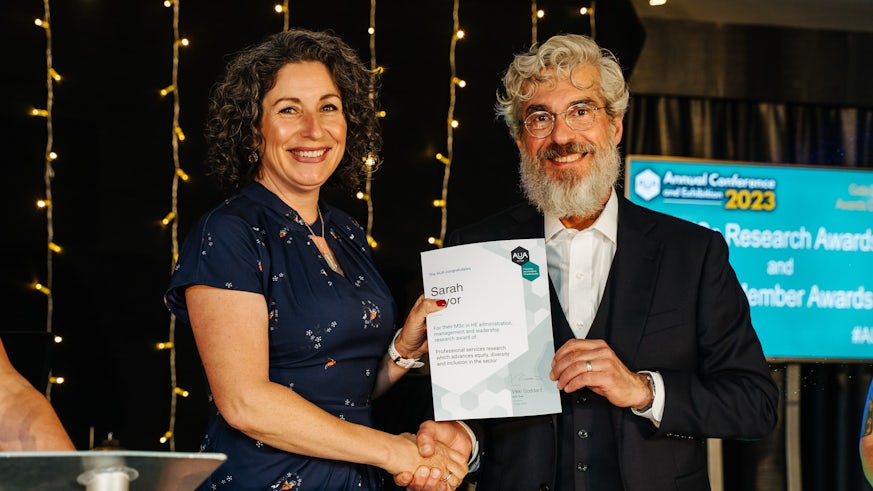Staff member receives national award for menopause research
31 July 2023

Sarah Pryor, Research Services Manager at Cardiff Business School, has received a national award for her MSc research about menopause in the workplace.
The Association of University Administrators (AUA) gave Sarah the award for ‘professional services research which advances equality, diversity, and inclusion in the sector’. It was one of only two awards given out this year at the annual AUA conference.
Sarah is a dedicated champion of raising menopause awareness in the HE workplace.
She tells us more about her research and motivations for studying this area…
Research overview
“My research explored how hybrid working impacts the management of menopause symptoms in Higher Education (HE) and Professional Services (PS) employees.
Research motivations
The research was part of my MSc in Higher Education Administration, Management and Leadership.
My topic was chosen for two reasons – one personal, and one an interest in the macroeconomic statistics for female/male employment.
Unbeknownst to me, I started suffering from severe menopause symptoms when I was around 43 years old but had no idea that was what it was. My psychological symptoms were particularly strong, with anxiety, depression, and imposter syndrome, not helped by crippling fatigue, brain fog, and concentration issues.
I felt I was underperforming in my job, so much so that I wrote a resignation letter. Luckily, the morning I was going to hand it in and resign, I read an article about a woman just like me – a former triathlete and runner who could barely get up off the settee and needed a daily nap. So many lightbulbs went off for me reading her account of her symptoms. Reading that article gave me the confidence to return to the GP and to advocate for HRT, which for me has been life-changing.
So I had this personal experience of nearly dropping out of the workforce, and when I looked at the labour market statistics, it looked like I was not alone – although the female/male employment gap has fallen from 28% in 2000 to 11% in 2022, women still make up the majority (around 71%) of part-time workers.
Research indicates that around 25% of menopausal women are considering leaving work, with 10% doing so, due to symptom severity and a lack of employer support. Research in the field of menopause in the workplace is still relatively undeveloped, so I knew this would be a good topic to study.
Research findings
Evidence suggested that poor workplace control and environment correlated with increased menopause symptom severity, whereas job control and task-based autonomy gave improved menopause experiences.
Supportive workplace environments and good line management yielded positive workplace menopause transitions, even in low autonomy roles.
Examples of actions that HE employers can take include:
- weaving menopause through HR policies
- using supportive PDR conversations
- providing workplace risk assessments to unlock reasonable adjustments
- raising staff awareness
- providing training for managers so that individuals are not forced to disclose their menopause status if they don’t wish to do so

Raising awareness about menopause
Since concluding the MSc, I’ve delivered three sessions to Cardiff University staff on menopause in the HE workplace.
I’m also using my experience and newfound knowledge to help host the Menopause Cafes and offer support in the online group, ‘Menopause Musings’, on Viva Engage, Cardiff University’s employee communications platform.
I’ve talked about my findings with senior staff and HR colleagues at Cardiff University.
I also delivered a session at the AUA conference and have since received invitations to speak about my research at different institutions.
Cardiff isn’t perfect as an institution, but it does have supportive resources for staff on the intranet:
However, in common with the other institutions that were part of my research, a lot of this support tends to be because of the energy and commitment of a few individuals who do it in addition to their ‘day jobs’ and more could be done to make that support more wide-ranging and consistent.
When you consider that the fastest employment growth rate in the UK is for women of menopause age, it is clear that there is both an economic argument and a moral imperative to support working women with menopause transition, increasing recruitment and retention of staff and improving staff wellbeing. I’m pleased to be able to help with this, even if in a small way.”
If you are interested in finding out more about Sarah’s research, contact her at: pryors1@cardiff.ac.uk
